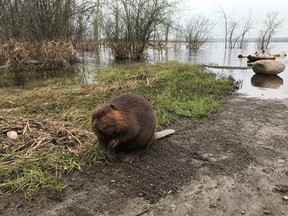
A draft plan will be released soon. But local environmental, conservation and community groups are frustrated over how public consultations have gone.

Article content
This week is National Wildlife Week, established in 1947 to encourage Canadians to learn more about wildlife and our connections to the natural world.
Ottawa residents will soon find out, with the release of a new urban Wildlife Strategy, how committed our city is to ensuring a healthy coexistence with wildlife. A draft plan is expected to be released soon.
Article content
It’s clear that progressive and humane solutions to human-wildlife conflicts are long overdue.
Advertisement 2
Article content
Last year in Kanata, a young black bear was shot 11 times by police as it attempted to flee.
A similar fate befell coyotes in Riverside Park South in late 2022 when residents witnessed the use of inhumane leg-hold traps and neck snares.
And each year the city continues to trap and kill about 150 beavers, a keystone species in establishing and maintaining wetlands that absorb and store carbon.
The city’s outdated approach to beaver management is also expensive, costing local taxpayers hundreds of thousands annually for repetitive maintenance as opposed to the more cost-effective use of flow-devices. These devices have been successfully deployed in stormwater ponds at the Department of National Defence campus on Carling Avenue in Ottawa.
At an April 2 emergency meeting, 40 residents and representatives from local environmental, conservation and community groups expressed frustration and anger with a public consultation process that seems designed to silence progressive voices rather than work collaboratively to find solutions to coexisting with wildlife.
Advertisement 3
Article content
For example, the “As We Heard It” report from two public information sessions and two surveys held last spring and summer was quietly released by the city last week. None of the stakeholders who had registered and participated in these consultations was notified.
This is not the timely, efficient and responsive manner one would expect from a meaningful consultation process that builds trust and credibility with communities and stakeholders.
The report found overwhelming support for wildlife. Nearly 90 per cent of respondents said their encounters with small and large wildlife were entirely or mostly positive. Some 85 per cent of respondents want the city to be proactive rather than reactive in preventing and responding to human-wildlife conflicts, including improved public education and outreach.
The report also identified “significant concern” among residents regarding the lethal trapping of beavers. Of those who expressed an opinion, 78 per cent stated that the protection of these animals is very important.
However, the report makes no mention of detailed position papers submitted by the Ottawa-Carleton Wildlife Centre (OCWC), and supported by many stakeholder organizations including Ecology Ottawa, Greenspace Alliance of Canada’s Capital and the Canadian Parks and Wilderness Society Ottawa Valley Chapter.
Advertisement 4
Article content
These common-sense recommendations, informed by more than 30 years of public education on coexistence, detail the essential ingredients needed for an effective urban wildlife strategy: public engagement and education; building lasting and trusting relationships with communities and local stakeholder organizations; and adopting best practices when it comes to human-wildlife encounters, wildlife sensitive planning and protecting wildlife during major construction projects.
Despite broad consensus for these recommendations, neither the Wildlife Centre or many other key wildlife, environmental or community stakeholders were contacted by the city. Having their voices silenced speaks volumes.
It’s reminiscent of what happened with the city’s failed Wildlife Strategy a decade ago. Recommendations from community organizations on the Wildlife Strategy Working Group were ignored in favour of an unseen proposal developed by a hunting and trapping advocacy group that categorized all urban wildlife as a “nuisance” subject for removal.
Mayor Mark Sutcliffe told reporters last August that increasing trust, transparency and accountability was “an enormous priority for me.”
What better way to demonstrate this commitment than by meaningfully engaging with stakeholders to develop an urban wildlife strategy that is cost-effective, humane and sustainable.
Debbie Lawes is a member of the Ottawa-Carleton Wildlife Centre and an Ottawa science writer.
Recommended from Editorial
Article content

